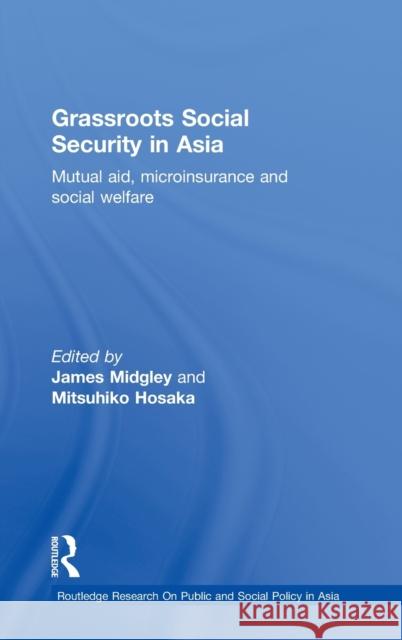Grassroots Social Security in Asia: Mutual Aid, Microinsurance and Social Welfare » książka
Grassroots Social Security in Asia: Mutual Aid, Microinsurance and Social Welfare
ISBN-13: 9780415493062 / Angielski / Twarda / 2011 / 176 str.
Grassroots Social Security in Asia: Mutual Aid, Microinsurance and Social Welfare
ISBN-13: 9780415493062 / Angielski / Twarda / 2011 / 176 str.
(netto: 741,76 VAT: 5%)
Najniższa cena z 30 dni: 705,23
ok. 16-18 dni roboczych.
Darmowa dostawa!
Grassroots Social Security in Asia investigates the role of mutual associations in providing income protection to low-income people in Asia and in particular the region's developing countries. Historically, these associations have consisted of small groups of people with common interests who save regularly to support, maintain and supplement their incomes. Members make regular contributions to a communal fund which is used to provide income protection when they experience financial hardship. This book is the first to comprehensively document the activities of mutual associations and their microinsurance programs in Asia where these programs are especially well developed. It provides a number of important case studies that provide detailed information about mutual associations in different parts of the region, covering South Asia, Sri Lanka, Thailand, Mongolia, Indonesia and the Philippines. The case studies offer important insights into the potential of mutual associations to offer effective income protection and how their activities can contribute to the formulation of comprehensive and effective grassroots social security strategies in the developing world that make a tangible contribution to the goal of poverty eradication and the improvement of standards of living. This book will be of interest to policy makers, academics and students in the fields of Asian studies, Social security studies and development studies. Mitsuhiko Hosaka is Professor and Dean of the Graduate School of International Social Development, Nihon Fukushi University in Japan James Midgley is the Harry and Riva Specht Professor of Public Social Services at the School of Social Welfare at the University of California, Berkeley, USA
Grassroots Social Security in Asia investigates the role of mutual associations in providing income protection to low-income people in Asia and in particular to the region's developing countries. Historically, these associations have consisted of small groups of people with common interests who save regularly to support, maintain and supplement their incomes. Members make regular contributions to a communal fund which is used to provide income protection when they experience financial hardship. In many parts of the world, these associations have grown in size and scope and have the potential to meet the income protection needs of low income people in the countries of the Global South who have historically been excluded from formal social security coverage.
This book is the first comprehensively to document the activities of mutual associations and their microinsurance programs in Asia where these programs are especially well developed. It provides a number of important case studies that provide detailed information about mutual associations in different parts of the region, covering South Asia, Sri Lanka, Thailand, Mongolia, Indonesia and Japan. The case studies offer important insights into the potential of mutual associations to offer effective income protection and how their activities can contribute to the formulation of comprehensive and effective grassroots social security strategies in the developing world that make a tangible contribution to the goal of poverty eradication and the improvement of standards of living.
This book will be of interest to policy makers, academics and students in the fields of Asian studies, Social security studies and development studies.











